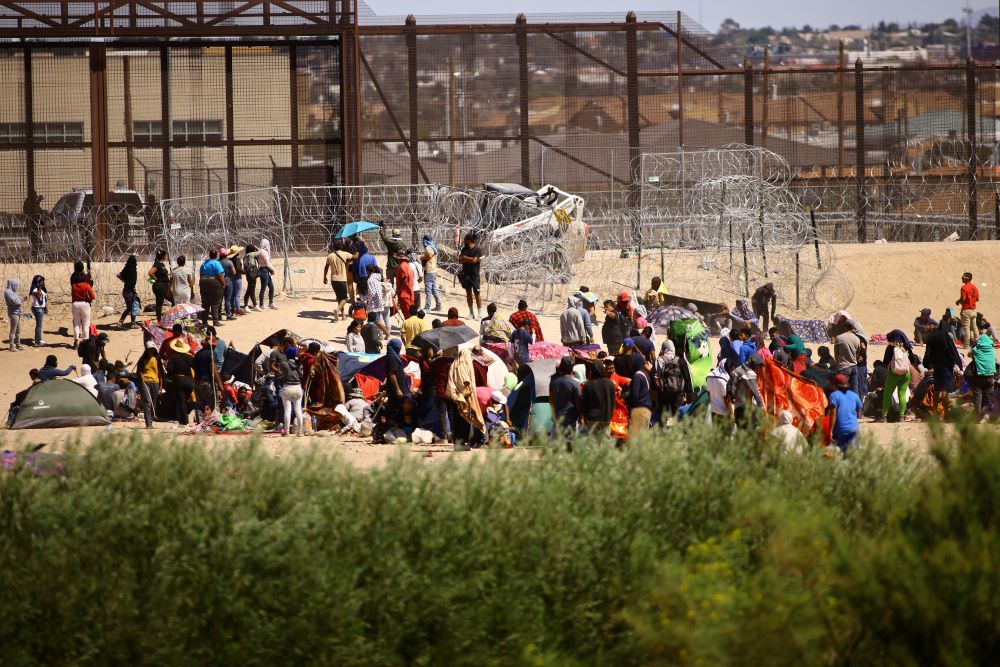A Venezuelan migrant from Piedras Negras, Mexico, thanks God while walking through the Rio Grande in an attempt to cross into Texas to seek asylum in the U.S. on Sept. 30. (OSV News/Reuters/Daniel Becerril)
Editor's note: The following is a collaborative reflection by Marissa Flores Madden and Bernadette Madden, told from the perspective of Marissa, who works at Catholic Charities Family Immigration Services in the Midwest.
I stayed home from my job at Catholic Charities today. I woke up feeling sick and assumed I was coming down with something. It wasn't until much later in the day when I realized what my body had been telling me: I wasn't well, but it wasn't from a virus. It was stress from my work as a U.S. Department of Justice accredited representative.
In most years, my time would be spent on family reunification cases. But this year has been dominated by hundreds of cases petitioning for Ukrainians and Afghans to remain in the United States, far from the violence and life-threatening terror in their home countries.
Working within the complexities of the U.S. immigration system breeds stress: stress from having to turn away countless potential clients because the laws are unjust and far too many people aren't eligible for immigration benefits; stress from the backlash and the blanket judgment of foreigners when I share about my work; stress from the ever-increasing hateful rhetoric targeting people who work with immigrants.
Scripture is clear on this. In no way are we to harm the foreigner. We are to treat them as any other person in our community. We are to love them even as we love our very selves.
When my husband Tony came home, I told him I knew why I was sick. And he kindly interrupted me before I could even explain, saying, "I just assumed it was stress from work."
Tony is from Mexico. He had recently told me that he used to think Americans just hated Mexicans, but now he thinks the hatred might extend to all foreigners. Could his ability to rapidly diagnose my condition be a direct result of the sickness that plagues him daily? The sickness that plagues our nation? I am threatened because I choose to work with immigrants, but he is threatened because of his very existence. Neither is OK.
Immigration antagonists will sometimes defend their stance by stating that their ancestors entered this country legally. And for many that is true. But throughout our country's history, the laws have always made it difficult, if not impossible, for specific people at specific times to immigrate legally, all while providing preferential treatment for those immigrants already steeped in privilege.
At least as far back as 1790, the U.S. restricted who could immigrate here and become citizens. The Page Act of 1875 and the Chinese Exclusion Act of 1882 restricting immigration based on nationality.
Operation Wetback expelled from the U.S. more than 1 million Mexicans — including many U.S. citizens — in 1954. Until the Immigration Act of 1990, sexual orientation was used as grounds for inadmissibility. The United States has always actively chosen to exclude specific groups of people.

Migrants, mostly from Venezuela, are seen from Ciudad Juarez, Mexico, as they gather near the U.S. border wall Sept. 24 after crossing the Rio Grande with the intention of surrendering to U.S. Border Patrol agents to request asylum. (OSV News/Reuters/Jose Luis Gonzalez)
Still, you don't need a U.S. immigration history lesson to recognize that the current state of immigration in our country. at best, lacks compassion. Nor do you need to believe in "open borders" to believe that showing compassion to all, especially the most vulnerable in our midst, is an act of basic humanity.
These days, countless actions and policies are undermining the inherent dignity of human beings: continuous calls in Congress to increase militarization of the southern border; governors transporting asylum seekers across the country under false pretenses to gain political support; the state of Texas placing razor wire in the Rio Grande to deter migrants from river crossing (and gravely injuring those who do attempt to cross). Such policies don't affect only the immigrants who are directly targeted. They impact all immigrants in our country.
If you don't know from personal experience, consider what it must be like to exist in a space where civil discourse has given way to demands not just for your expulsion, but your extinction. These policies affect both immigrants and those of us who work with them in varying capacities. Perhaps less obviously, these policies also contribute to our national identity — who we are, what we believe and what we stand for.
Given that more than 60% of the U.S. identifies as Christian and many of today's most prominent U.S. politicians claim that their Christian faith informs their politics, it would seem obvious to use Scripture to illuminate topics as controversial as immigration. The Bible can be contorted to fit many political perspectives, but it is pretty clear on the issue of immigration. The book of Leviticus gives instructions as to the treatment of foreigners:
When an alien resides with you in your land, do not mistreat such a one. You shall treat the alien who resides with you no differently than the natives born among you; you shall love the alien as yourself; for you too were once aliens in the land of Egypt (Leviticus 19: 33-34).
A similar command is given in the New Testament as well, underscoring the importance of the former instructions:
Do not neglect hospitality, for through it some have unknowingly entertained angels (Hebrews 13:2).
Scripture is clear on this. In no way are we to harm the foreigner. We are to treat them as any other person in our community. We are to love them even as we love our very selves. Still, the tragic reality is that our country is more than a long way off from getting this right.
Compassion, mercy and charity are universal human impulses, and as Christians we know that our namesake is the embodiment of these virtues. His teachings abound in them. The good Samaritan parable is a story of showing mercy to a stranger, in fact to an enemy. The Beatitudes tell us that the peacemakers, the merciful and those who are persecuted for the sake of righteousness are among the blessed. Feed the hungry. Give drink to the thirsty. Welcome the stranger. Clothe the naked. Care for the sick. Visit the imprisoned. If after reading these verses we do not feel compelled to embody the same compassion, mercy and charity as Jesus, then we are missing the whole point.
Advertisement
Our country suffers from a deficiency of compassion, mercy and charity, and our treatment of immigrants is not its sole symptom. Having compassion for others has become political. Responding in anger toward those with whom we disagree has become typical. Assuming the worst of another has become nearly instinctual.
Still, every time a national tragedy occurs — whether it's an act of indiscriminate violence or targeted racism — politicians and citizens alike will inevitably claim, "This is not who we are." But a quick glance backward tells us otherwise. Our history is proof that racism, bigotry and xenophobia are very much a part of our national identity, despite our frequent claims of the moral high ground. This is exactly who we are.
But is it who we want to be?
Identity is complex. Our country's past failures and current struggles have shaped us, but hope for a different tomorrow can be transformational, too. And throughout our sordid history there have always been good Samaritans, people who have taken Scripture to heart and have embodied the compassion, mercy and charity of Christ to extend care to those most in need. I should know: At Catholic Charities, I get to work with such people every day. And every day I assist newcomers to the United States who are grateful and relieved to have arrived here safely. And every day I go home to Tony, whose opportunities in the United States brought us together.
Brokenness and blessings. Grief and gratitude. Lamentation and love. Many things can be true at once.
Yes, our country is in need of self-examination. Still, there are signs of restoration all around us, and I have to believe that together we can heal. Together we can do better.
And that's why I am going back to work tomorrow.








